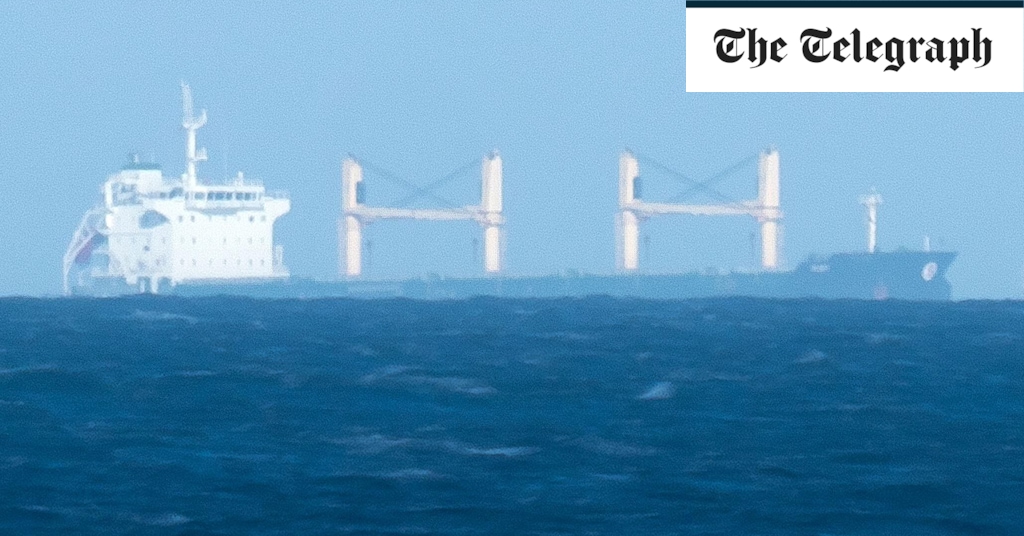A cargo ship with links to Russia packed with explosive fertiliser is floating off the Kent coast after being denied entry at other ports over safety fears.
Ruby, a Maltese-flagged cargo ship carrying 20,000 tonnes of ammonium nitrate fertiliser from a port in Russia, was ordered out of Tromso in Norway and turned away from Danish waters.
More alleged shenanigans with this craft drifting around the North Sea, ostensibly enroute to the Canaries.
“This is a ship that nobody wants, but that nobody can get rid of.”
20,000 tonnes of ammonium nitrate
i see something resembling a solution, right there
Blowing up beached whales disperses the problem, but does not solve it.
The Danish media reported that it has the explosive potential of a first generation nuke.
Pretty sure this is the same shit that blew up in the Beirut port. I wouldn’t let a Russian ship full of that shit into my port.
It’s not shit, it’s an artificial shit substitute
Soylent explosives
Soylent boom
Remember the Beirut explosion? Yeah, that
Remember the Beirut explosion?
Now realize that it was caused by around 1/10th as much ammonium nitrate that is on this ship (2750 vs 20000 tonnes)yeah, you really don’t want that ship anywhere near people or infrastructure
if that was mixed with fuel, sure (15kt) but on its own should be a bit less (6.5kt)
It’s a thing they do, bit mafia-esque, they sail a mostly un-seaworthy hulk full of oil, minerals, heavy metals, in this case fertilizer, off the coast of a picturesque port of yours, and say “here’s your order, you better pay to pick it up!”.
Either you wait for the ship to go aground and destroy the local environment, or you buy the stuff, offload it, and pay them to tow the ship “outside of the environment”.
It’s their way of forcing sales and trying to break their way back into markets in a fairly threatening way.
It’s not intentional. They screwed up the ship and nobody wants a damaged ship full of enormous amounts of explosive material in their port.
The ship has been seeking a port for it to dock in as it is in need of repairs, having cracked its hull after previously running aground.
Jens Wenzel Kristoffersen, a defence analyst at Nordic Defense Analysis and a former naval officer, questioned why the ship had not been ordered to return to Russia.
He said that its condition and cargo posed an environmental and health risk.
“One can question whether it is at all justifiable for the ship to be allowed to sail. There are several reasons for this,” he told Danish media. “It has cracks in the hull. It has rudder problems. It can no longer sail by itself, but must be towed.”
He added: “This is a ship that nobody wants, but that nobody can get rid of.”
That ship in Beiruit had similar issues – it wasn’t seaworthy, so wasn’t allowed to leave, because it wasn’t seaworthy, and the owners just abandoned it in port, where (a) all the ammonium nitrate was offloaded and the port authority in Beiruit had to deal with it and (b) the sunken hull.
https://en.wikipedia.org/wiki/MV_Rhosus
MV Rhosus was a general cargo ship that was abandoned in Beirut, Lebanon, after the ship was declared unseaworthy and the charterers lost interest in the cargo. The 2,750 tonnes of ammonium nitrate which the ship was carrying was confiscated and brought to shore in 2014, and later contributed to the catastrophic 2020 Beirut explosion. The vessel’s owner at the time of abandonment was Cyprus-based Russian businessman Igor Grechushkin. The ship sank in the Port of Beirut in 2018.
The ship is still blocking Beirut port space.
I think that a likely better concern is less that the thing is going to just blow up after reaching port – though I did read an earlier article pointing out that if repairs require welding, that it’s a risk – and more that it might wind up abandoned in port like the other ship.
I’m sure Ukraine could find a use. Maybe we tow it to a port of their choosing?
Where’s the Black Sea fleet hiding again?
Just tie it up right next to a diesel oil freighter and let it bask in the London Thames for a bit.
Ammonium nitrate isn’t dangerous.
It’s not gunpowder, it’s not rocket propellant, it’s not liquified natural gas
you need extreme heat and fuel to make it detonate, in the Beirut case that was given by nearby stored fireworks, but otherwise it’s pretty safe to use, you can blast it with a blowtorch and it doesn’t even burn
The misconception of it being explosive comes from the fact that people buy it as fertilizer and then use it to make bombs by mixing it with fuel and other primary and secondary explosives (or just to have some fun with homemade gunpowder), and even then, usually you use potassium nitrate, a derivative of ammonium nitrate, because the ammonium nitrate is just so goddamn hard to detonate
Now, should they accept the ship? I don’t know, as far as I know Russia’s regulations might as well allow storage of ammonium nitrate inside the ship’s fuel tanks, but some simple checks would mitigate 99.99999% of risks.
That said, it’s still Russia and we shouldn’t be giving it money anyways, but I’m not gonna get into politics here
I think it’s just a bullshit article trying to manufacture drama, as though Russia sent this bomb or something.
you need extreme heat and fuel to make it detonate
Wouldn’t lightning be extreme heat? The North Sea is very stormy.
The rain would quickly render it useless as an explosive, and if it was inside a container the metal would shield it
and even then, ammonium nitrate is just an oxidiser, (in layman’s terms, it makes already flammable stuff burn faster when ignited, so fast that in some cases it detonates), and without fuel it can’t do anything on it’s own
As a wise (and drunk) man once said:
“KE-BLEWWWEY!!” -demoman tf2Which part of Kent? I hope it’s not hanging around the wreck of the SS Richard Montgomery!
K-k-k-kent! It’s c-c-c-coming to k-k-k-kill you!
deleted by creator
In Russia, even the fertiliser kills you.
Surely our Russian friends only ever had the best and most honest intentions with this.
Take it to Africa and drop all the stuff in the 🏜️ desert
Daily Telegraph (UK) - News Source Context (Click to view Full Report)
Information for Daily Telegraph (UK):
MBFC: Right - Credibility: Medium - Factual Reporting: Mixed - United Kingdom
Wikipedia about this sourceSearch topics on Ground.News













